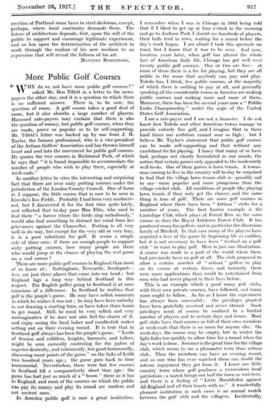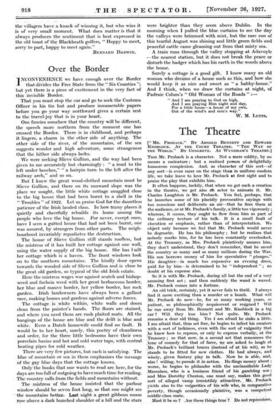More Public Golf Courses
HY do we not have more public golf courses ?" asked Mr. Ben Tillett in a letter to the news- papers the other day, and it is a question to which there is no sufficient answer. There is, to be sure, the question of room. A golf course takes a good deal of room, but it also absorbs a large number of players.
• Harassed rate-payers may exclaim that there is also the question of money, but public golf courses, when they are made, prove so popular as to be self-supporting. Mr. Tillett's letter was backed up by one from J. H. Taylor, the famous professional, who is a vice-president of the Artisan Golfers' Association and has thrown himself heart and soul into the movement for public.golf courses. He quotes the two courses in Richmond Park, of which he says that " it is found impossible to accommodate the mimber of people who wish to play there, especially at week-ends."
In another letter he cites the interesting and surprising fact that there are over sixty putting courses under the jurisdiction of the London*County Council. One of these is, I suppose, the little course that is now to be seen in Lincoln's Inn Fields. Probably I had been very unobserv- ant, but I discovered it for the first time quite lately, and reflected that to-day poor MisS Flite, who used to find there " a bower where the birds sing melodiously," would also find something to distract her mind from her grievances against the Chancellor. Putting is all very well in its way, but except for the very old or very lazy, it is a poor substitute for golf. It seems a simple- rule of three sum : if there are enough people to support sixty putting courses, how many people are there who would jump at the chance of playing The real game on a real course ?
There are more public golf courses in England than most of us know of ; Nottingham, Newcastle, Southport— here are just three places that come into my head ; but England lags a long way behind Scotland in this respect. The English golfer going to Scotland is at once conscious of a difference. In Scotland he realizes that golf is the people's game. He may have selfish moments in which he wishes it was not ; he may have been unlucky in not drawing a starting time, or have taken three hours to get round. Still, he must be very selfish and very unimaginative if he does not also feel the charm of it, and enjoy seeing the local baker and candlestick maker setting out on their evening round. It is true that in Scotland golf always has been the people's game. " Lords of Session and Cobblers, knights, baronets, and tailors, might be seen earnestly contesting for the palms of superior dexterity, and vehemently, but good-humouredly, discussing moot points of the game " on the links of Leith two hundred years ago ; the game goes back to time immemorial. Nevertheless, there were but few courses in Scotland till a comparatively short time ago : the game has had just as much of a " boom " there as it has in England; and most of the courses on which the public can pay its money and play its round are modern and not ancient ones.
In America public golf is now a great institution. I remember when I was in Chicago in 1913 being told that if I liked to get up at four o'clock in the morning and go to Jackson Park I should see hundreds of players, their balls teed in rows, waiting for a round befOre the day's work began. I am afraid I took this spectacle on trust, but I know that it was to be seen. And now, fourteen years later, when golf has altered the whole face of American daily life, Chicago has got well over twenty public golf courses. One or two are free : at most of them there is a fee for playing, but they are all public in the sense that anybody can pay and play. Toledo has, I think, five public courses, at the majority of which there is nothing to pay at all, and generallY speaking all the considerable towns in America are making public courses and making more and more of them. Moreover, there has been for several years now a " Public Links Championship " under the aegis of the United States Golf Association.
I am a rate-payer and I am not a financier. I do not know how Toledo and other American towns manage to provide entirely free golf, and I imagine that in these hard times our ambition cannot soar so high ; but I believe Mr. Taylor's statement that public golf courses can be made self-supporting, and that without any exorbitant fee for playing. I fancy that many of us have had, perhaps not clearly formulated in our minds, the notion that certain games only appealed to the moderately well-to-do. One of these games is lawn tennis. A towns- man coming to live in the country will to-day be surprised to find that the village lawn tennis club is—possibly sad to say—more popular and more prosperous than the village cricket club. All conditions of people like playing lawn tennis if they only get the chance, and the same thing is true of golf. There are some golf courses in England where there have been " Artisan " clubs for a number of years. The best known example is the Cantelupe Club, which plays at Forest Row on the same course as does the Royal Ashdown Forest Club. It has produced many fine golfers, and in particular the illustrious family of Mitchell. In that case many of the players have acquired a love of the game by beginning life as caddies, but it is not necessary to have been " teethed on a golf club " to want to play golf. Here is just one illustration. A course was made in a part of the world where there had previously been no golf at all. The club proposed to allow a certain number of " artisan " golfers to play on its course at certain times, and instantly there were more applications than could be entertained from men who had never played in their lives before.
This is an example which a good many golf clubs, with their own private courses, have followed, and many more ought to follow. As far as I know the experiment has always been successful ; the privileges granted have been gratefully received and never abused. Such privileges must of course be confined to a limited number of players and to certain days and hours. Most golf clubs have their courses so full of their own members at week-ends that there is no room for anyone else. On week-days the course may be empty, but in winter the light fades too quickly to allow time for a round when the day's work is done. Summer is the great time for the village club, which seems to me a pleasanter term than artisan club. Then the members can have an evening round, and no one who has ever watched them can doubt the intense enjoyment they get from it. I know one little country town where golf produces a tremendous local patriotism ; a match brings out half the town as watchers, and there is a feeling of " Little Hambledon against All England and all their hearts with us." A wonderfully pleasant institution in such cases is an annual match between the golf club and the villagers. Incidentally, the villagers have a knack of winning it, but who wins it is of very small moment.' What does matter is that it .always produces the sentiment that is best expressed in the old toast of the Blackheath golfers, " Happy to meet, sorry to part,_ happy to meet again." .
BERNARD DARWIN:























































 Previous page
Previous page